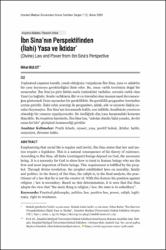| dc.contributor.author | Bulut, Nihat | |
| dc.date.accessioned | 2021-06-22T08:19:59Z | |
| dc.date.available | 2021-06-22T08:19:59Z | |
| dc.date.issued | 2020 | en_US |
| dc.identifier.citation | Bulut, N. (2020). İbn Sina’nın perspektifinden (ilahi) yasa ve iktidar. İstanbul Medipol Üniversitesi Hukuk Fakültesi Dergisi, 7(1), 55-72. https://dx.doi.org/10.46547/imuhfd.2020.07.1.09 | en_US |
| dc.identifier.issn | 2148-6883 | |
| dc.identifier.uri | https://dx.doi.org/10.46547/imuhfd.2020.07.1.09 | |
| dc.identifier.uri | https://hdl.handle.net/20.500.12511/7258 | |
| dc.description.abstract | Toplumsal yaşamın kurallı, yasalı olduğunu vurgulayan İbn Sina, yasa ve adaletin bir yasa koyucuyu gerektirdiğini ifade eder. Bu, onun varlık teorisinin doğal bir sonucudur. İbn Sina’ya göre bütün sonlu (mümkün) varlıklar, zorunlu varlık olan Tanrı’ya bağlıdır. Sonlu varlıkların ilki ve en önemlisi olan insanın nasıl davranacağını göstermek Tanrı açısından bir gerekliliktir. Bu gereklilik peygamber üzerinden yerine getirilir. İlahi vahiy aracılığı ile peygamber, ahlak, aile ve siyasete ilişkin yasaları koymuştur. İbn Sina’nın kuramında halife, son tahlilde, kendisinin yaratıcısı olmadığı bir yasanın uygulayıcısıdır. Bu özelliğiyle din/yasa karşısındaki konumu ikincildir. Bu tespitten hareketle, İbn Sina’nın, “aslolan dindir/ilahi yasadır, devlet onun fer’idir” görüşünü benimsediği görülür. | en_US |
| dc.description.abstract | Emphasizing that social life is regular and lawful, Ibn Sina states that law and justice require a legislator. This is a natural consequence of his theory of existence. According to Ibn Sina, all finite (contingent) beings depend on God, the necessary being. It is a necessity for God to show how to treat to human beings who are the first and most important of finite beings. This requirement is fulfilled by the prophet. Through divine revelation, the prophet established laws on morality, family and politics. In the theory of Ibn Sina, the caliph is, in the final analysis, the practitioner of a law that he is not the creator of. With this feature his position against religion / law is secondary. Based on this determination, it is seen that Ibn Sina adopts the view that “the main thing is religion / law, the state is its subsidiary”. | en_US |
| dc.language.iso | tur | en_US |
| dc.publisher | İstanbul Medipol Üniversitesi | en_US |
| dc.rights | info:eu-repo/semantics/openAccess | en_US |
| dc.subject | Pratik Felsefe | en_US |
| dc.subject | Siyaset | en_US |
| dc.subject | Yasa | en_US |
| dc.subject | Pozitif Hukuk | en_US |
| dc.subject | İktidar | en_US |
| dc.subject | Halife | en_US |
| dc.subject | Meşruiyet | en_US |
| dc.subject | Direnme Hakkı | en_US |
| dc.subject | Practical Philosophy | en_US |
| dc.subject | Politics | en_US |
| dc.subject | Law | en_US |
| dc.subject | Positive Law | en_US |
| dc.subject | Power | en_US |
| dc.subject | Caliph | en_US |
| dc.subject | Legitimacy | en_US |
| dc.subject | Right to Resistance | en_US |
| dc.title | İbn Sina’nın perspektifinden (ilahi) yasa ve iktidar | en_US |
| dc.title.alternative | (Divine) law and power from Ibn Sina’s perspective | en_US |
| dc.type | article | en_US |
| dc.relation.ispartof | İstanbul Medipol Üniversitesi Hukuk Fakültesi Dergisi | en_US |
| dc.department | İstanbul Medipol Üniversitesi, Hukuk Fakültesi, Kamu Hukuku Bölümü, Genel Kamu Hukuku Ana Bilim Dalı | en_US |
| dc.authorid | 0000-0002-7318-0466 | en_US |
| dc.identifier.volume | 7 | en_US |
| dc.identifier.issue | 1 | en_US |
| dc.identifier.startpage | 55 | en_US |
| dc.identifier.endpage | 72 | en_US |
| dc.relation.publicationcategory | Makale - Ulusal Hakemli Dergi - Kurum Öğretim Elemanı | en_US |
| dc.identifier.doi | 10.46547/imuhfd.2020.07.1.09 | en_US |


















